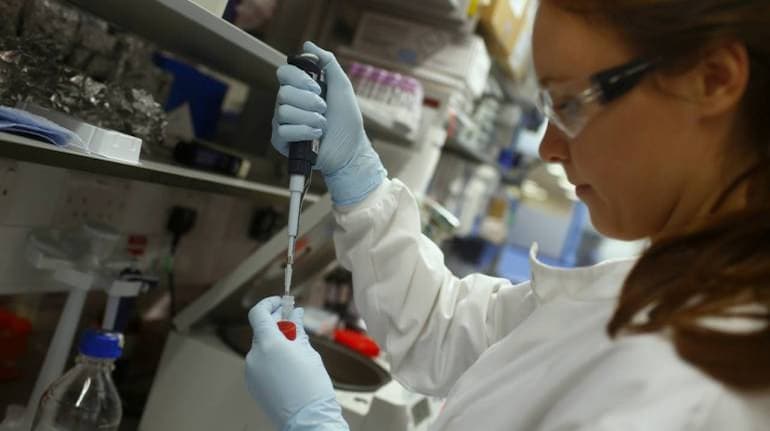
With global pharmaceutical companies trying to develop a vaccine for COVID-19, Indian companies too are trying to crack the code.
At least three Indian vaccines makers - Serum Institute of India, Zydus Cadila and Bharat Biotech - are involved in the initiative.
Serum Institute is a step ahead with its programme in pre-clinical phase. It has partnered with US-based clinical-stage biotechnology company Codagenix to rapidly co-develop a live-attenuated vaccine against coronavirus. Live-attenuated vaccines contain live but weakened virus. The company said it plans to make the vaccine market ready by 2022, and possibly even advancing the launch.
Cadila Healthcare (Zydus) told stock exchanges that it has started work against Coronavirus vaccine while Bharat Biotech is yet to make any formal announcement.
Zydus said it is working on two approaches to develop vaccines, one is a DNA vaccine that is based on small portion of virus DNA to generate immune response and another is a live attenuated recombinant measles virus vectored vaccine against COVID-19.
An executive who heads the vaccine division said it takes a 14-28 days to take a vaccine candidate from lab to pre-clinical or animal testing.
"Animal testing takes about one month, but documentation takes about 3-4 months, so around six months is bare minimum to get a vaccines from animal to human testing. Human clinical trials fast tracked take at least 12-18 months, a vaccine should take at least 1.5 to 2 years on fast track basis," said an executive on condition of anonymity.
The traditional vaccine development timeline is 15 to 20 years.
Track all the updates on coronavirus outbreak here
There are several approaches to develop a vaccine. One is the conventional approach of using the pathogen or its antigen to draw immune response. The science and approval pathways are more established.
Another one is the new generation vaccines that uses DNA and messenger RNA (that carries the code from DNA to produce relevant protein), which is yet to be approved by USFDA for human use. Currently, there are 30 ongoing projects globally to find a vaccine against COVID-19 using different approaches.
Also Read: No passengers from EU, Turkey, UK into India from March 18
But US biotech company Moderna Therapeutics pipped others. Moderna vaccine entered phase-1 clinical trial where it will be tested on humans. Moderna begun human testing without fully studying how well the vaccine candidate prevents infection in animals. Moderna is developing a vaccine using mRNA approach.
High costs and viability issues
Executives belonging to two Indian vaccine companies who are working on coronavirus vaccine say the likelihood of vaccine succeeding against Coronavirus is high, based on what their current understanding of the pathogen.
"So far, (COVID-19) is stable that's what we know, we hope and pray that it will remain the same," said the executive quoted above.
More than the vaccine candidate, what's worrying Indian companies are high costs associated with funding clinical trials, committing human resources and building manufacturing facilities compliant with BSL-3 (biosafety level) conditions.
A biosafety level is a set of bio-containment precautions required to isolate dangerous biological agents in an enclosed laboratory facility. The levels of containment range from the lowest biosafety level 1 to the highest at level 4.
For instance Serum Institute estimated the cost of the project at Rs 300 crore. Serum indicated that it is may look at securing outside funding.
Sources told Moneycontrol that Bharat Biotech too is looking at partners to fund the development costs.
Indian vaccine companies rely on funding from government, WHO, Coalition for Epidemic Preparedness Innovations (CEPI) and non-profits like Bill and Melinda Gates Foundation, to fund vaccine development projects and de-risk the costs of investment.
But even after funding clinical trial costs and setting up manufacturing facilities, company's aren't sure they would get a payback.
Indian companies learned hard, when they jumped to develop vaccines against H1N1 influenza outbreak in 2009 but soon realised that there isn't much demand for the vaccine.
"The vaccines for epidemics and pandemics, are not usually the once with recurrent demand. Ebola happened once, there may not be an Ebola outbreak requiring millions of doses for the next 10-15 years, this means it may not be commercially attractive for the organisations to make huge investments. So there is need for public-private partnership to minimise the risk of vaccine development," the executive added.
Discover the latest Business News, Sensex, and Nifty updates. Obtain Personal Finance insights, tax queries, and expert opinions on Moneycontrol or download the Moneycontrol App to stay updated!
Find the best of Al News in one place, specially curated for you every weekend.
Stay on top of the latest tech trends and biggest startup news.